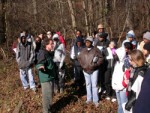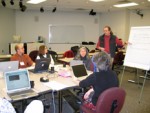In November 2003 the Ecological Society of America’s Strategies for Ecology Education, Development and Sustainability (SEEDS) program in collaboration with LTER sponsored an undergraduate field trip to Washington D.C. and to the Baltimore Ecosystem Studies LTER (BES).
Steward Pickett and Alan Berkowitz led 25 students through the field to teach them about hydrology and urban ecology. Students learned from other LTER scientists about specific research questions and sampling taking place at BES. This was the first SEEDS trip to an LTER site.
The Network Office is developing a partnership with SEEDS/ESA to include more LTER sites in these field trips. The benefits will be mutual:
SEEDS students and faculty will learn about research at LTER sites, and scientists at LTER sites will have an opportunity to meet and interact with underrepresented students to attract them to their projects.
Education representatives also have been working toward developing cross-site initiatives to integrate LTER research, data, and education.
In February 2004 Steve McGee (LUQ) hosted a proposal-writing workshop at the Center for Environmental Technologies (CET) at Wheeling Jesuit University in West Virginia with participants from 10 LTER sites.
The group discussed the components of and drafted the initial plan for submitting cross-site funding proposals to the NSF’s Teacher Professional Continuum (TPC), and Instructional Material Development (IMD) Programs.
The thrust behind the TPC proposal is to create tools and resources for teachers to help them use LTER data in their classrooms. Peter McCartney, information manager from CAP, provided much needed input in the development of a possible model to include in the proposal. Education Committee chair Robert Bohanan (NTL) led the discussion.
The main focus of the IMD proposal is to develop a life-science curriculum for middle schools based on major LTER synthesis themes. Steve McGee led the discussion with Monica Elser (CAP), Ali Whitmer (SBC), and Pamela Snow (HFR).
Also participating were David Campbell, NSF program director via conference call, Debbie Reese (CET), and Sonia Ortega, Education Director from the Network Office. While it is exciting to see these network-wide education projects develop, both these initiatives will depend on the participation of many LTER sites.

 Enlarge this image
Enlarge this image
